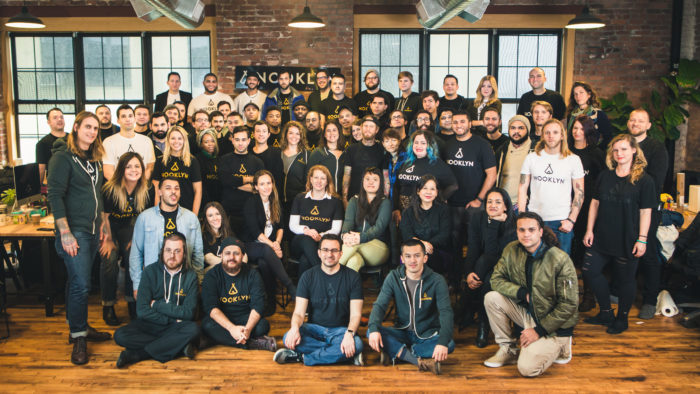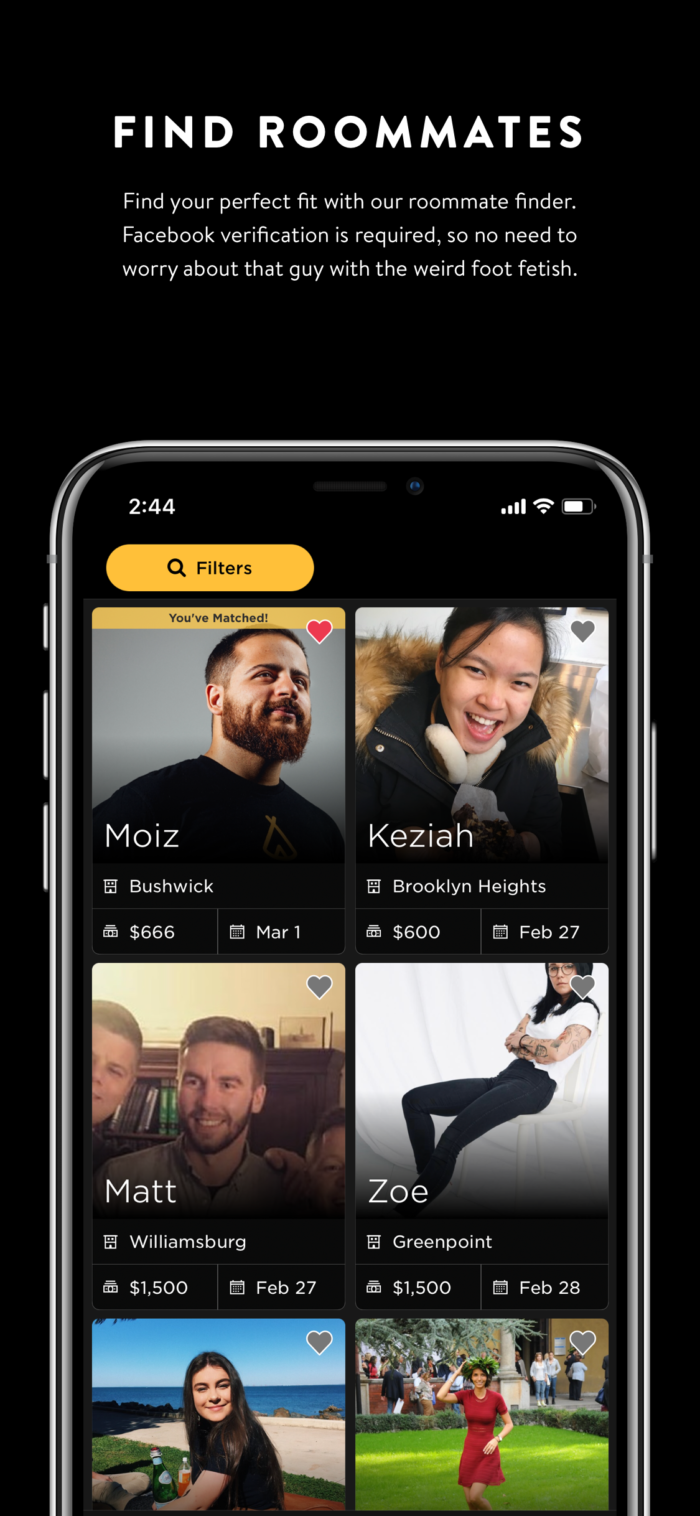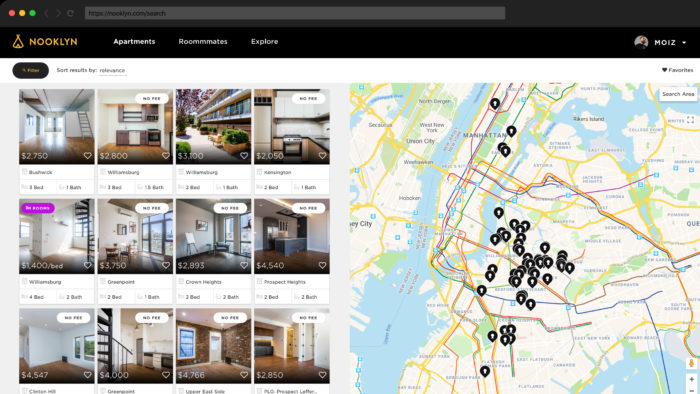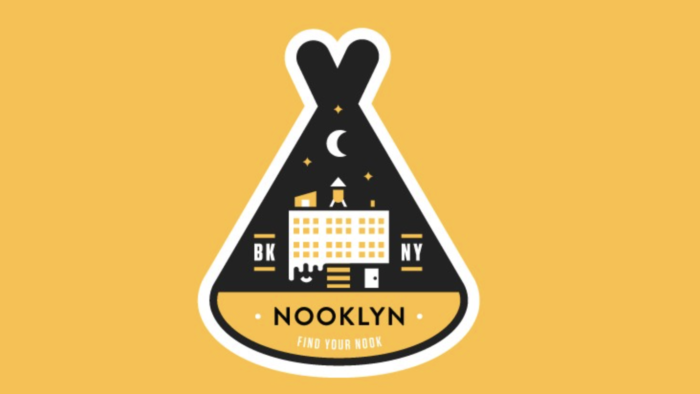Sitting in a coffeehouse near the Bushwick headquarters of his real-estate company, Nooklyn, founder and CEO Harley Courts contemplates whether he had some extra freedom as a child, growing up close to the Brooklyn Bridge in Manhattan, the son of a composer and an actress. “Maybe too much,” he says, before punctuating the thought. “Yeah. Definitely.”
Tall, with long blond hair and both arms sleeved with tattoos, Courts talks punk rock and heavy metal with optimum ease. But his truest passion, undeniably, is skateboarding. “Once I found a skateboard, I stopped coming home for dinner,” Courts continues. That was at about age 10 or 11. “I was just out, exploring all of New York.”
Though his safety was perhaps compromised, now, at 31, married and the father of two, Courts considers himself fortunate to have been able to roam at such a young age. He became profoundly self-reliant, and adopted an entrepreneurial spirit. While the first company he started, a skateboard maker, went under during the last recession, his next venture has boomed. The apartment-rental site he launched in 2010 is now one of Brooklyn largest real-estate firms, ranked by headcount, with 300 agents. Last year, Nooklyn helped 9,989 renters find apartments, the company says.

A portion of Nooklyn’s staff, which includes 300 agents and is expected to double this year
While North Brooklyn has been the company’s launching pad, its ambition ranges beyond. The company’s digital platform, which helps users get through the multiple headaches of finding an apartment, from searching for roommates to making payments, gives the company growth potential. In February, the company raised a seed-investment round of $825,000, led by Patoma, a Brooklyn-based real-estate development firm. The funding will help Nooklyn to expand its engineering and design teams, as well as launching its first Manhattan office, scheduled to open in May on the Lower East Side.
The founder’s extroverted nature led to an early start in business. “I sold glow sticks on the beach,” he says, recounting his first business venture on a July 4 trip out to Long Island with his parents. He bought scores of glow sticks from a wholesaler at 33 cents each, hawking them for $3 or $4 on the shoreline. He says they were all sold within an hour. He was 12 years old.
As Courts was absorbed by the city’s skateboarding scene, friendships and connections he made within it would propel him toward the launch of his first grown-up business, Substance Skateboards, just as he graduated high school. “I would read all the [skateboard] magazines,” Courts says. “It was more the marketing that always seemed the draw for me. I always envisioned my ads in the magazine.”

Among other features, the company’s app helps prospective renters find suitable roommates
He sidestepped college and successfully ran Substance Skateboards for a few years before the economy tanked in 2008. An investor pulled out of the company just as a new line of boards was about to hit the market, leaving Courts to cover the cost. Courts did his best to keep the company afloat, but eventually went broke. He couch-surfed for months before landing a job as superintendent of a 140-unit residential building in Bushwick. “I got an apartment out of the deal,” Courts says. “I’d never taken a job before.”
He filled the position for just a few months, but during that time he got to know the real estate agents who were closing deals throughout the building. One of them was Joseph Friedman, who Courts remembers telling him it was possible to earn a living renting apartments in Brooklyn. “Joseph pretty much saved my life at that point,” Courts says of the man who would later become his partner in Nooklyn. “He gave me a whole bunch of keys to empty apartments and I just went crazy. I think I made about $10,000 my first month I got into real estate.”
As it turned out, his transition from skateboard merchant to rental agent was easier than it looks. “I was cold calling skate shops, selling skateboards,” Courts says. “The sales part I got down pretty well. I knew how to work with people, and I think that’s what really matters. I sold myself.”
Then, in 2010, Courts built the first iteration of Nooklyn.com to give clients easier access to his rental inventory. What made his site different from Craigslist, which at that point was a go-to place for real-estate listings, was that Nooklyn was simply up-to-date. He made sure the property photos were current, the descriptions were accurate, and the design was user-friendly. “I grew a big following doing that, and I had to hire agents because I was just too busy,” he says. “But our biggest [attraction] was really transparency and having an honest approach, which was not conventional at the time.”
While technology gives Nooklyn an edge, the company’s human side is the most distinctive part of its corporate culture. Courts says it comes directly from the skateboarding world. “I brought this kind of family culture with me to Nooklyn and it’s influenced every decision since,” he declares on the company website. “Most of our deals are split between multiple agents,” he says, saying that Nooklyn employees are allowed to gravitate toward roles that suit their personalities and skills. Some are great with sales, while more detail-oriented folk take charge of the paperwork. “We have a very collaborative culture, a very entrepreneurial culture.”
A related lesson that Courts has learned as CEO is “to identify leaders, delegate and give away control,” he wrote last year in a post on Medium. “I have met many founders who are adamant about holding onto control over aspects of business that aren’t their greatest strengths. Focusing on just the things that I’m good at and passionate about is the only way to stay motivated and scale effectively.”

From the outset, the founder was determined to make sure the photos and descriptions of listed apartments were accurate and up-to-date
Though skateboarding is an individual exercise, Courts says the camaraderie between skaters at any park is palpable. “I always say that if I have 50 cents and my [skater] friend has 50 cents, now we have an Arizona iced tea,” Courts observes, referencing the tallboy cans that have cost 99 cents for more than a quarter century in city delis. “We’ve brought that mentality here. We don’t look at each other like competition.”
What’s of greater intrigue to their clientele is the current iteration of Nooklyn’s digital platform, which Courts says provides an “end-to-end” and “streamlined” rental service. When signing up, users create a profile, which looks in part like a Facebook page, with other hopeful renters as “friends,” intertwined with a Pinterest board so users can “like” certain listings and even neighborhood hotspots. Clients can stroll through the virtual marketplace, concentrating their search by cost, bedroom and bathroom numbers, amenities, and even subway lines. They can message an agent to schedule a viewing and coordinate meetups with other interested renters, which helps in finding occupants for multi-bedroom flats. If the user would like to move in to a place, they can apply online, filing tax forms and other paperwork.
In 2016, the company launched the “Nooklyn Pay” feature, which lets users pull money from external bank accounts and place it into their Nooklyn profile for the various payments that come with renting an apartment. (Soon, Nooklyn renters will be able to buy furniture this way, too.) Last year, Courts says the company processed $19 million in transactions, of which $15.5 million was through Nooklyn Pay. Users can see the leasing process unfold on the site up until the time they’re ready to move in; they can even observe when their roommates file their required paperwork.

The company has put a priority on distinctive graphics, like its teepee-shaped logo
Courts asserts that the platform gives more control of the process to renters, vs. traditional methods that give the landlord the upper hand. “That’s the core of it: Changing the sales process [at Nooklyn], how important that is to the future of renting, and how easy it’s going to be in the next few years to find an apartment by removing all the friction,” says Courts. “When it’s ten times easier to rent an apartment than it is today, no one’s going to go back to the original model.”
He says Nooklyn has more than doubled its sales force this past year, with brokers seeing the benefits. “About 49,000 renters are visiting Nooklyn every single month,” says Courts. “If you work for any traditional firm, they give their inventory to third parties: Zillow, Streeteasy, Craigslist, etc. About 40% to 50% of our leads are coming directly through our platform.” (Nooklyn boasts a commercial real-estate wing as well.)
With Nooklyn offering advantages to both renter and broker, the company has seen sales double every year since the platform’s launch five years ago, according to Courts. He says that since 2015 they have moved more than 25,000 renters and processed over $51 million in rental payments. This year the company plans to hire an additional 375 agents.
“We really just think about this business much differently,” Courts says of his Nooklyn team. “We’re really trying to create a company that is going to last a long time.” The Nooklyn model could conceivably pop up in any city of sufficient size. But for now, and for a change, Courts is content with staying put in the five boroughs, perfecting the platform and giving as many New Yorkers the chance to experience it as possible.